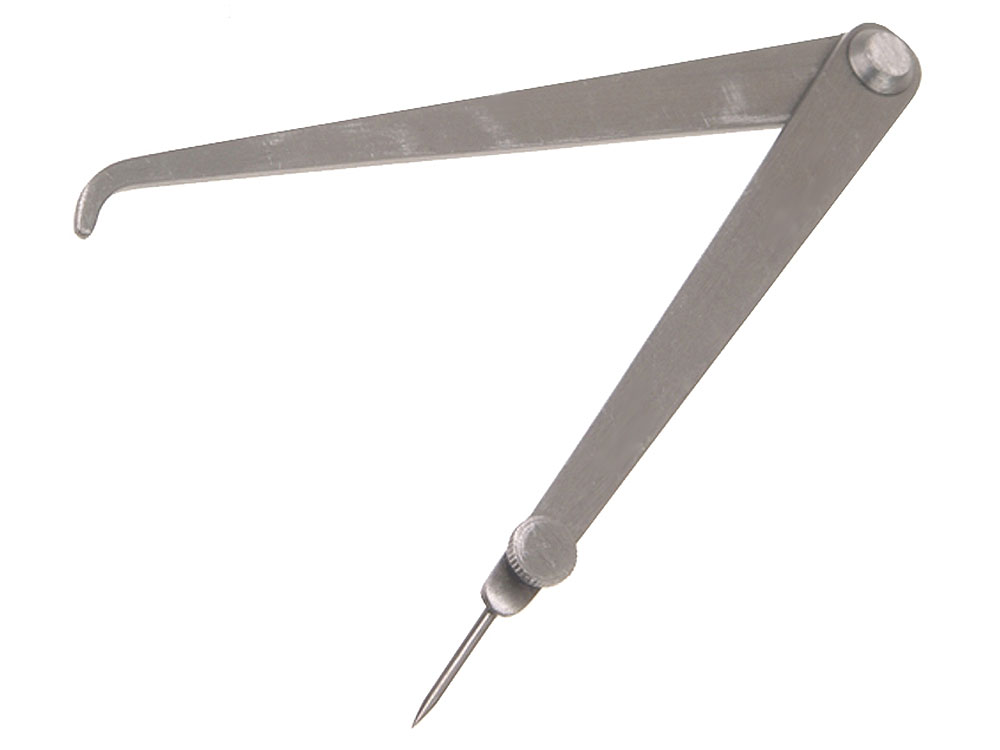Without seeing the contents of the set it's difficult to judge how well-made the tools are but they're probably OK. You can always upgrade later.
Much depends on what you do. Here's my take on the contents:
1). 6" Steel Rule – much used.
2). 4" Brass Pocket Caliper – little used, replaced by a Digital Caliper, which is!
3). Bore Gauge – Don't have one, but only because I keep forgetting to order it.
4). Screwcutting Gauge – Rarely used because I almost always cut threads with inserts and don't angle the toolpost. (The gauge is useful when threads are cut with an HSS cutter held at at angle.)
5). Met/imp Screw Pitch Gauge – much used to check threads. Imperial vs metric, plus fine vs coarse.
6). 4" Dividers – useful, but little used. I also have bow, inside, outside, and jenny calipers. The Jenny calipers are my favourite, see below
7). Automatic Centrepunch – much used
8). Angle Gauge – don't have one, replaced by Digital meter, protractor, or
9).Pocket Scriber – much used
10). 4" Engineers Square – much used
11). Protractor – rarely used, replaced by Angle blocks and Digital Angle Meter
Old school technique depended on marking out. This involves painting lumps of metal with marking blue fluid, and carefully scribing lines locating edges and holes. The lines are drawn relative to a reference, and at right-angles, which makes the Engineers' square valuable. Holes are marked with crossed lines, and centre-popped to guide a twist drill, or locate dividers. A surface table and height gauge are also valuable if this method is adopted seriously.
Marking out is particularly useful your only power tool is a lathe. For example, drilling off-centre holes, the work is clamped to a facing plate so that the centre pop is aligned with a drill held in the tailstock.
But marking out may not be necessary today. If you own a Digital Caliper and a Milling Machine, especially if the mill is fitted with a DRO, it's possible to dispense with marking out and marking out tools. Marking out is a complete waste of time when CNC machines are available, but in my manual workshop I do a kind of shorthand marking out, intended to remind me where the reference points, holes and edges are, but the actual accuracy is provided by edge-finding, DRO, and other methods.
Knowing how to mark-out is valuable, but you may find it's little used, Hence some of the tools in that set may stay in the box forever!
Off-the-cuff, missing from that set:
- Micrometer – vital
- Centre-finder
- Fine pointed centre-punch and hammer. (Used to accurately locate holes for the automatic punch)
- Squares in different sizes: 4" is fine, but larger and smaller sizes may be helpful
- Edge-finders and wobblers
- Jenny, or Hermaphrodite, Caliper

Tool quality is a matter of debate. Professional engineers avoid words like 'quality' and 'decent' because they are technically meaningless. Instead, they engage brain and define what they want in terms of 'fit for purpose' and 'value for money'. What's meant by 'fit for purpose' and 'value for money' varies with individuals and depends hugely on what they are doing.
I take a utilitarian line – the cheapest tool that will do the job is good enough, and if it's not good enough I replace it. This saves a great deal of worry about breaking and wearing them out, having them nicked, or the workshop becoming a burden on my children. Is this stuff valuable or not?
To me, tools are for using. Others are thoroughly irritated by anything other than the best, or at least what they think is the best. (In my book condition is far more important than reputation.) Before WW2, there was a sharp divide between well-made and inferior tools. There was much value in the advice 'buy the best you can afford'. The advice is less sound today because advances in technology have given us mid-range tools, which are neither top-of-the range or complete rubbish. I go for mid-range, and find them satisfactory – mostly. Choose more carefully if you have a solid professional requirement for reliable tools, or enjoy 'quality'.
Probably the best way of learning what's good and bad about tools is to use them. That set could be worth £30 for the learning experience alone!
Dave
Edited By SillyOldDuffer on 13/05/2021 10:37:39
bernard towers.






